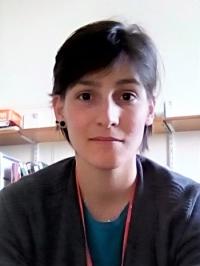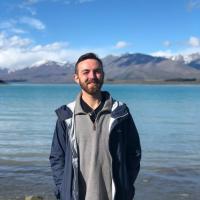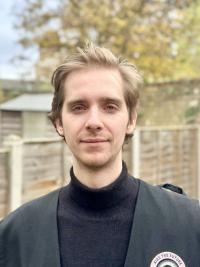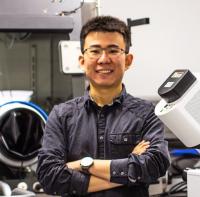Research Associates
The College’s Research Associate (RA) Scheme offers short-term collegiate affiliation to postdoctoral researchers and others in similar posts at Cambridge. The RA Scheme offers an opportunity for involvement in the intellectual and social life of the College. RAs are primarily based at Leckhampton, the principal home of our postgraduate community, where a range of lectures and research events are held across the academic year. Leckhampton’s extensive grounds include a dining hall, where informal dinners are served most nights of the week, the College’s playing fields and gym, a music room, and, not least, its famous and extensive gardens.
CURRENT RESEARCH ASSOCIATES
Dr Christina Boukouvala is a materials scientist with a background in engineering and in her research she studies light-matter interactions at the nanoscale. To understand how nanostructures interact with light she employs both computational and experimental techniques, including electromagnetic simulations, single particle spectroscopies and microscopies as well as nanoparticle shape modelling approaches. Currently, she is particularly interested in exploring the potential of magnesium nanoparticles as a sustainable platform for sensing applications, and especially for enhanced spectroscopies.
Dr Julia Empey received her PhD in English and Film Studies at Wilfrid Laurier University. Dr Empey is a SSHRC Postdoctoral Fellow in the Faculty of English at the University of Cambridge and the book reviews editor at Interconnections: The Journal of Posthumanism / Interconnexions: revue de posthumanisme. Her research and publication interests focus on contemporary literature and film, feminist and posthumanist theory, and science fiction literature, film, and media. Her other interests include eco-criticism, cosmopolitan studies, and political theory. She is the co-editor of Feminist Posthumanism in Contemporary Science Fiction Film and Media (Bloomsbury 2023). Dr Empey’s current research project examines the ethics, possibilities, and limitations of mind uploading – replicating human consciousness through artificial intelligence (AI) –and the role of science fiction in shaping collective perspectives about the future. Using a combination of ethnographic research and textual analysis, Dr Empey is assessing how the concept of mind uploading has shifted over time and how expressions of race, class, dis/ability, sex, and gender shape mind uploading development and its future dissemination. Further, she explores if mind uploading offers liberating possibilities or upholds current systems of power and alternative, non-AI based forms of mind uploading.
Dr Giulia Grisot is Teaching Associate at CDH for the MPhil in Digital Humanities. Her current research focuses on the investigation of culture and identity in literary texts, using NLP and machine learning to examine represented space and encoded sentiments. As an applied linguist, she is also interested in the mechanisms by which humans process and understand language and literature, and in the ways linguistic data can be explored computationally.
Dr Harriet Fagerberg
Dr Ben Jenkins is a Herchel Smith Postdoctoral Fellow in the Department of Biochemistry. He completed his PhD at the University of Exeter in 2019, followed by a postdoc at the University of Oxford. In 2021, he was also an EMBO Exchange Fellow at Heidelberg University.
His research focus is endosymbiosis – the biological process of one organism living within another. Endosymbiosis is responsible for the formation of reef-building corals, the invasion of notorious intracellular parasites, and the evolution and spread of photosynthetic organelles (plastids) across the tree of life. He previously developed an experimental approach of gene knock-down in the model endosymbiotic protist, Paramecium bursaria, to better understand the evolutionary processes that can drive the emergence of an endosymbiotic interaction.
Ben now works with the model for corals, Aiptasia. Using a combination of experimental and computational approaches, he aims to identify the cellular changes that occur when endosymbiosis breaks down. This is important, because break-down of endosymbiosis is the cause of coral bleaching that is currently devastating marine ecosystems.
Dr Bruno Marinič earned his DPhil in Organic Chemistry at the University of Oxford under the supervision of Prof. Tim Donohoe, where he worked on developing new dearomatisation reactions of N-heterocycles. He is currently a Career Development Fellow at the MRC Laboratory of Molecular Biology, working in the group of Prof. John Sutherland FRS. His current research is interested in elucidating the origin of life. More specifically he is focused on developing prebiotically plausible systems that would allow for the assembly of RNA from monomeric building blocks.
Dr David Yallup is a postdoc in the Department of Physics, based in the Kavli Institute for Cosmology. His research career started with a PhD in particle physics from UCL, where he was a member of the ATLAS experiment at the Large Hadron Collider. During this time he worked mostly on the interface between theory and experiment, developing tools to interpret the LHC results in novel ways. His next career step was switching fields from physics on the very smallest scale to the largest, joining the Cosmology group in Cambridge in 2021. In Cambridge David works with the world leading inference group within Cambridge Cosmology, focusing on the art (and science) of inference and modelling across the world of fundamental physics. His current main topics of interest are in Bayesian Machine Learning and explainable AI, with applications ranging from industrial challenges to fundamental science at both the biggest and smallest known scales in physics.
Dr Zhexin (Eric) Wang is a postdoctoral researcher at MRC Laboratory of Molecular Biology. He completed his Dr. rer. nat (PhD) in Germany at Max Planck Institute of Molecular Physiology in 2022. Eric’s research focuses on understanding complicated biological systems using advanced in situ electron microscopy. During his doctoral studies, he developed a workflow using cryo focused-ion-beam (cryo-FIB) milling and electron cryo-tomography (cryo-ET) to image muscle fibres. Using these techniques, he revealed the delicate muscle structures essential for contraction and involved in muscle diseases.







